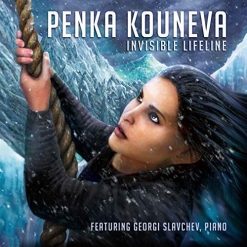
Invisible Lifeline
Penka Kouneva and Georgi Slavchev
2018 / Pan Colony Records
31 minutes
Review by Kathy Parsons
Invisible Lifeline is a powerful and fascinating album of eight pieces composed by Penka Kouneva. The album is based on the premise of: “If Frederic Chopin, Sergei Rachmaninoff, Clara Schumann or Alma Mahler were composing movie themes in the 21st century, what would their music sound like?” How is that for an original concept? The album is a collection of six solo piano fantasias performed by Georgi Slavchev, and two string orchestral tracks. All eight pieces are very classical in styling and each tells a story about what motivates the creative artist. Kouneva utilized several sources on creativity and inspiration, but her primary source was her own experience as a woman, wife, mother, artist and composer for film, TV, video games and virtual reality. This is her first collaboration with international piano virtuoso Georgi Slavchev, who added his own arrangements to the piano tracks. Invisible Lifeline was also inspired by Penka’s ongoing work with her mentor and manager, Victor Rodriguez, and the album is a gift for his 50th birthday.
Penka Kouneva was born and raised in Sofia, Bulgaria, where she received classical training in piano and theory; she started composing at the age of 12. In 1990, she left Bulgaria with a Duke University composition fellowship and $130 in her pocket. In 1997, she made history at Duke by receiving the first-ever Doctorate in Composition from that revered institution. In 1999, she began her career in Los Angeles as the orchestrator for Emmy-winning composer Patrick Williams and was given her first scoring break later that year.
The first six tracks on Invisible Lifeline are the piano solos. The album begins with “A Shipwreck of Our Plans,” a piece that boldly expresses the rage and anguish of rejection. The piece starts out with furious anger and then very effectively alternates between heartbreak and fury. Slavchev pulls out all the stops and lets the emotions fly - from tender and fragile to a turbulent whirlwind. Very impressive! “The Invisible Lifeline” is an expression of passion and love. It begins fairly quietly, but there is an underlying tension running through the music that intensifies to a tempestuous middle section. Near the end, ascending chords seem to symbolize the lifeline and rescue. Who hasn’t tossed late into the night at times, wishing for what seems to be out of reach? “Nocturnal” is a dark and restless expression of the melancholy and longing of an insomniac at 3 AM. “Another Failure” conveys the emotional turmoil of personal and/or professional disaster. Sometimes brooding and sometimes reeling with anger, the ending is bleak and mournful. “The Fifth Tool” refers to The Tools, a book by Phil Stutz and Barry Michels, and deals with the transformative fear of facing unrealized potential on the last day of life. It’s a terrifying thought and the piece does an amazing job of reflecting that! Much of the piece is played in the deep bass of the piano, and is dark and foreboding. “Farewell to E.” is much softer emotionally, but is sad and mournful as it reflects on the bliss, sorrow and gratitude of aging. “Ascension” is a short violin piece about spirituality and meditation. Penka explains “Alma Mahler’s Daughter”: “I’m motivated by the unwritten music of women composers through history – the women who abandoned their art. This orchestral track mourns the loss of the music they could have created.” There are no words to add to that other than it’s heart-rending and achingly beautiful.
Invisible Lifeline is an amazing album and likely to be one of my Favorites for 2018. It is available from Amazon and iTunes.
December 1, 2018

